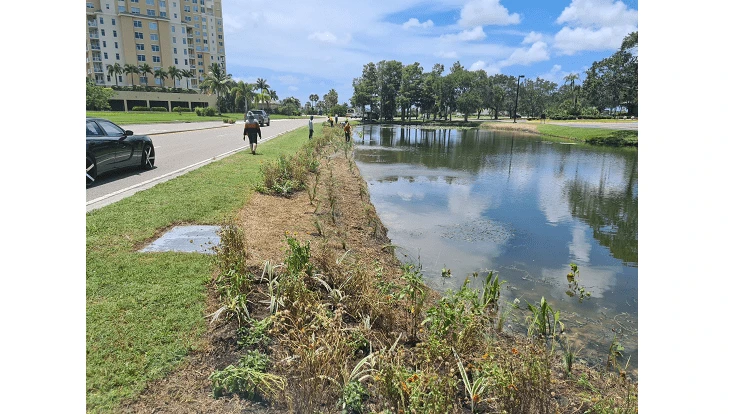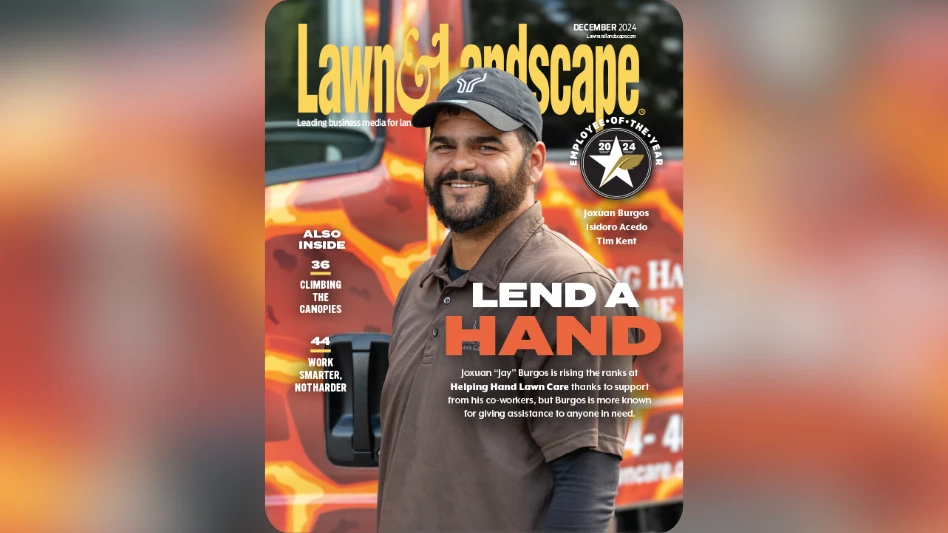
Extension environmental horticulture agent Michelle Atkinson sees potential for a 50-square-mile community east of Sarasota, Florida, to teach the state important lessons about how to reduce the incidence of green rivers and red tides without homeowners having to do a thing.
Lakewood Ranch has hundreds of stormwater ponds. Atkinson and her colleagues at the University of Florida Institute of Food and Agricultural Sciences are doing experiments to see whether those ponds can clean water, not just hold it.
What they learn at ponds as well as at public sites such as the Bradenton Area Convention Center could have huge implications for Florida. Until recently, we had no idea how huge.
UF/IFAS ecologist Basil Iannone wondered how many stormwater ponds we have in Florida. So he and UF/IFAS agricultural engineer Eban Bean counted them. With sophisticated mapping software, they located 76,000.
The potential of ponds as powerful anti-algae tools had been hiding in plain sight. The only body of water a majority of Floridians see at least twice weekly is not the gulf, the ocean, a river, a spring or a lake. It’s a stormwater pond.

stormwater ponds.
Why start at the ranch? Because the community has long welcomed scientists inside the gates to share science that makes it a more sustainable community. As the UF/IFAS Extension Manatee County environmental horticulture agent, Atkinson has for years educated residents on irrigation, fertilization and other landscape best practices. It’s her job as well to deliver science directly to the neighborhood associations that control what gets planted where.
Her credibility and service-oriented approach has earned her the trust of Lakewood Ranch management, which has granted the UF/IFAS team access to a handful of ponds. It also earned the trust of Manatee County government, which has provided Atkinson with $50,000 worth of pond plantings for her research at several county parks.
The scientists want to discover whether plants instead of grass on the banks of the Ranch ponds’ perimeters could act as filters. The thinking is that the more grass cuttings and storm water debris the plants trap, the more fertilizer runoff from nearby lawns they can eat, and the less would make it into our ponds and groundwater where they contribute to harmful algal blooms.
The U.S. Environmental Protection Agency sees the potential for Lakewood Ranch to teach Florida and the nation as well. It has granted Iannone $197,000 to monitor water quality, to try different mixes of plants, and to gauge how effective each mix is in filtering.
This is a social question as well. The research aims to get a feel for what the ponds’ neighbors find attractive. To have impact, innovations have to be embraced by people who aren’t scientists.
That’s why the UF/IFAS Center for Land Use Efficiency team, which includes Iannone and Atkinson, has social scientist Paul Monaghan. While the biological and physical scientists seek a mix of pondside plants that filter water and attract wildlife, Monaghan will gauge whether residents believe the plantings obstruct their “waterfront” views or look too much like a tangled, wild mess.
Stormwater ponds have the potential to be a resource beyond flood control. If the UF/IFAS team and its government, industry and residential partners can identify the right mix of plants, stormwater ponds could do invaluable work protecting our water quality. The pond plantings could host pollinators and other wildlife, or host “good” bugs that feed on and outcompete pests.
Replacing grass with plantings can also protect your landscaping staff, who can get injured when their mowers tip over on grassy pond slopes.
Atkinson is a university scientist, but not on the main UF campus in Gainesville. She’s a neighbor of the Manatee County people she serves. That’s how Extension works. UF/IFAS scientists work in every county on solutions to local problems. And sometimes a solution in one county can be a lesson for the other 66. Atkinson’s work has the potential to raise Lakewood Ranch’s profile as a leader in sustainability and to change the way we landscape our ponds.
The work for the EPA grant will not be done until 2024, although, we will have data on water quality collected by Dec 2023. We will also have a large portion of social data collected by then as well.
J. Scott Angle is the University of Florida’s Vice President for Agriculture and Natural Resources and leader of the UF Institute of Food and Agricultural Sciences (UF/IFAS).
Latest from Lawn & Landscape
- The news you read the most
- Senske acquires 2 Nutri-Lawn franchise operations in Canada
- Our Holiday Lighting Contest rolls on
- LawnPro Partners acquires Ohio's Meehan’s Lawn Service
- Landscape Workshop acquires 2 companies in Florida
- How to use ChatGPT to enhance daily operations
- NCNLA names Oskey as executive vice president
- Wise and willing





